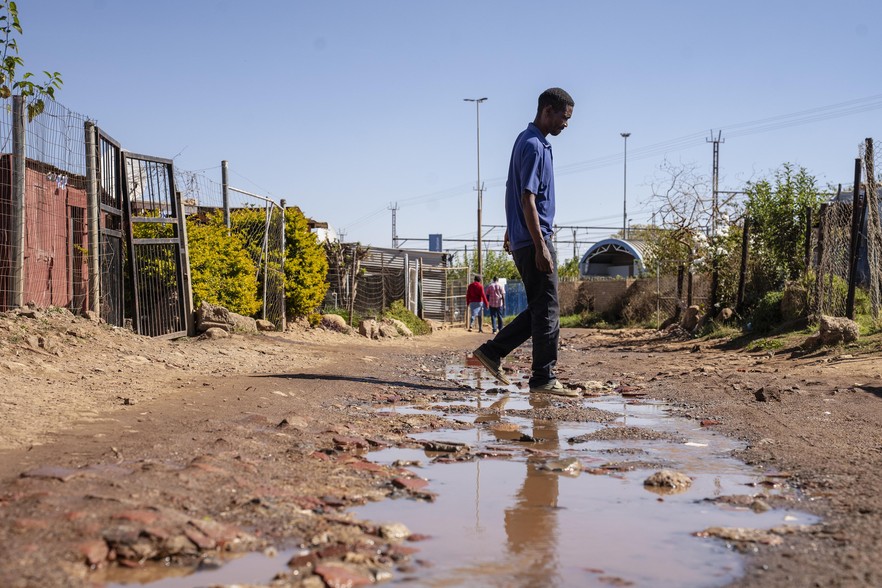
24 May 2025
Moses Malebana says he often has to jump over puddles of dirty, smelling sewage water next to his shack at Marikana informal settlement in Mamelodi. Photos: Ihsaan Haffejee
Families living in Marikana informal settlement in Mamelodi have been living without proper access to basic services like toilets and running water for over eight years.
Residents we spoke to say they’ve had no choice but to connect electricity and water illegally to survive. Many are unemployed and rely on social grants.
Most of the more than 600 people who live on a flood line near the Pienaars River, first moved onto the land in 2016. They hoped that the City of Tshwane would eventually provide basic services until they were allocated RDP houses. But years later, nothing has changed and conditions at the settlement are deteriorating.
Marikana informal settlement was established in 2016.
Some households have dug their own pit toilets, but other relieve themselves in the surrounding bush. There is flowing sewage water in the potholed-streets. Illegal electric wires hang from poles overhead and inside yards. Households pay up to R350 a month to RDP homeowners in the neighbouring community to connect to electricity and water.
Resident Lebogang Ngxila pays R250 to use electricity which was connected by community leaders to her home. She said she struggles to cook food for her family because the power supply isn’t stable. “It often trips early in the evening when most of us are cooking,” said Ngxila.
Illegal electricity connections make a web over the streets of the settlement.
Moses Malebana is one of several residents we spoke to who complained about a lack of road maintenance and electricity.
He said they have to jump over puddles of dirty, smelling water next to their shacks. “When some cars pass here at high speed, they splash my home with this dirty water,” said Malebana, who is unemployed.
He said he could no longer afford to pay the electricity fee, so his illegal connection was switched off two months ago. He now boils water and cooks on a wood fire.
Another resident, Nonhlanhla Galeka, lives with her boyfriend and their 11-month-old baby. She told GroundUp that she has to leave her baby alone in the shack each time she relieves herself at a neighbour’s pit toilet 400 metres away.
“I cannot build a toilet in my yard because my stand is very small. This place is very cold because it is next to the river. My baby gets the flu very often,” she said.
Galeka claims that several officials from the City previously visited the community on different occasions. She said the officials promised that they would get basic services and that they would be relocated to land more suitable for housing.
Nonhlanhla Galeka says she has to leave her baby alone in her shack each time she goes to relieve herself at a neighbour’s pit toilet 400 metres away.
Ronald Nemakula said he applied for an RDP house in 2000 at the City’s Department of Human Settlements, but he is still waiting. He built his shack in Marikana after spending many years waiting for the house. “I want to be relocated to a safe place because life is difficult here,” he said.
Gabeiel Nyodzani said that he relieves himself in the nearby bushes because he does not have a toilet in his yard. He said a lack of running water makes it difficult to cook and wash clothes. “My life will be better if the municipality can give us chemical toilets and send trucks here to deliver water every week.” He added that when it rains, the river swells and floods their homes.
One of the pit toilets in bad condition at the Marikana informal settlement in Mamelodi.
City of Tshwane spokesperson Lindela Mashigo told GroundUp that the City does not have plans to formalise Marikana because the land is on a flood line and therefore isn’t suitable for housing. Mashingo confirmed that there are plans to relocate 220 homes but would not give further details about this.
Asked to respond to the residents’ claims that the City promised to provide them with basic services, Mashigo said the City currently doesn’t have funds to provide services to Marikana. On the illegal connections, the City says it plans to remove them and take action against those involved.
Marikana informal settlement is overcrowded and residents rely on illegal connections for water and electricity.